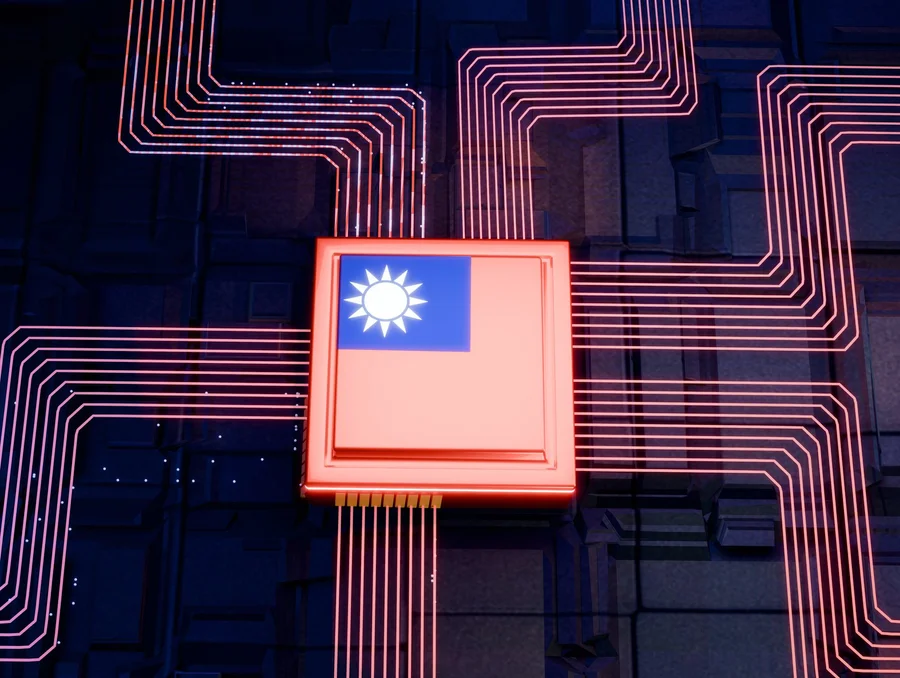Taiwan seeks global tech partnerships and EU deal to boost semiconductor cooperation as it seeks to strengthen its position in the worldwide chip industry.
The global semiconductor industry has become a focal point of geopolitical and economic strategy, with nations worldwide seeking to secure chip supplies and reduce dependence on a limited number of producers.
Taiwan, home to Taiwan Semiconductor Manufacturing Company (TSMC), the world’s largest contract chipmaker, plays a pivotal role in the global semiconductor supply chain.
As geopolitical tensions rise, particularly between China and Taiwan, countries are increasingly looking to diversify their semiconductor production capabilities and strengthen ties with Taipei, the capital city of Taiwan.
Taiwan’s global tech collaborations
While Taiwan pushes for closer economic ties with the EU, its tech companies are actively expanding collaborations with firms across the globe.
“Looking to the future, Taiwan hopes to take an innovative approach towards the signing of an economic partnership agreement with the EU”. – Taiwan’s President, Lai Ching-te.
This strategy aims to solidify Taiwan’s position as a key player in the global technology ecosystem and mitigate risks associated with geopolitical uncertainties.
TSMC
TSMC, the Taiwanese multinational semiconductor contract manufacturing and design company for instance, has been expanding its global footprint beyond its new plant in Dresden, Germany.
The company is also constructing a US$12bn facility in Arizona, USA and exploring potential investments in Japan.
These moves are part of a broader trend of Taiwanese tech firms seeking to diversify their manufacturing bases and strengthen partnerships with international customers.
MediaTek
MediaTek, another Taiwanese semiconductor giant, has been collaborating with major global tech companies to develop 5G technologies and AI-powered chips.
The company additionally has partnerships with firms in the US, EU and Asia, highlighting the interconnected nature of the global tech industry.
“Taiwan, a vibrant democracy with an open economy, is a trusted partner for us to promote our economic security,” Maria Martin-Prat, Deputy Head of the European Commission’s Directorate General for Trade says to Reuters.
EU-Taiwan economic partnership prospects
Taiwan’s President Lai Ching-te’s call for an economic partnership agreement with the EU underscores Taiwan’s desire to formalise and strengthen its ties with like-minded democracies.
Such an agreement could provide a framework for deeper collaboration in critical technologies, including semiconductors and AI.
The potential deal would not only enhance economic ties but also serve as a strategic move to secure Taiwan’s position in global supply chains.
The EU, for its part, has been actively courting Taiwan as a partner under the European Chips Act.
KEY FACTS ABOUT TAIWAN’S TECH SECTOR:
- Taiwan is home to TSMC, which produces over 50% of the world’s contracted semiconductor chips
- TSMC is expanding globally, with new facilities in Germany and the US
- Taiwanese tech firms are increasingly diversifying their partnerships and manufacturing bases worldwide
- The proposed EU-Taiwan economic partnership could significantly impact global semiconductor supply chains
- The European Chips Act aims to double the EU’s share of global semiconductor production to 20% by 2030
This initiative aims to boost semiconductor production within Europe and reduce reliance on Asian suppliers.
TSMC’s investment in Dresden is a significant step in this direction, potentially serving as a model for future collaborations.
Challenges and opportunities
While the prospects of closer Taiwan-EU ties are promising, several challenges remain. China’s opposition to Taiwan’s international engagements and the EU’s lack of formal diplomatic ties with Taiwan could complicate negotiations.
Additionally, balancing the interests of domestic European chip manufacturers with increased Taiwanese involvement will require careful consideration.
However, the potential benefits of enhanced cooperation are substantial.
For Taiwan, closer ties with the EU could provide greater economic security and diplomatic support.
For the EU, partnering with Taiwan offers access to cutting-edge semiconductor technology and expertise, crucial for its technological sovereignty ambitions.
As the global technology landscape continues to evolve, Taiwan’s push for international partnerships, exemplified by the proposed EU economic deal, reflects the interconnected nature of the modern tech industry.
The outcome of these efforts will likely have far-reaching implications for supply chains, innovation and geopolitical alignments in the coming years.
“Looking to the future, Taiwan hopes to take an innovative approach towards the signing of an economic partnership agreement with the EU,” Taiwan President Lai Ching-te tells Reuters.
“This would not only make both our economies more resilient and secure, but also ensure the stable operation of global supply chains.”



